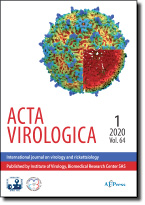Acta Virologica Vol.65, No.3, p.303-306, 2021
|
| Title: Diversity of porcine reproductive and respiratory syndrome virus in Shandong, China |
| Author: Rui-Xue Xue, Sheng-Fu Sun, Yun-Gang Li, Miao-Li Wang, Gui-Sheng Wang, Yu-Jie Li, Yue Zhang, Xue-Hua Wei, Feng Chen, Jing-Jiao Ma, Zou-Ran Lan |
|
Abstract: Porcine reproductive and respiratory syndrome virus (PRRSV) is one of the most economically significant pathogens in swine industry of China. To study infection and genetic variation of PRRSV, 637 tissue samples were collected from diseased pigs in Shandong, and then subjected to detection of PRRSV. The nsp2 and ORF5 genes were sequenced for investigation of variations and phylogenetic analysis. The results showed that positive rate of PRRSV was 9.58% in the collected samples. Phylogenetic analysis of GP5 showed that these strains were clustered into two lineages (1 and 8) indicating different genotypes of PRRSV were circulating in Shandong province. Meanwhile, sequence analysis Of nsp2 showed that the PRRSV strains with 30 amino acids deletions were dominant. Moreover, novel pattern of recombination/deletion and insertion in nsp2 was observed in these strains, indicating that novel PRRSV strains with different patterns of deletions or insertions in nsp2 are emerging in China. All the results suggested that continuous surveillance of PRRSV in China is warranted.
|
|
| Keywords: PRRSV; GP5; nsp2; genetic analysis; Shandong |
|
|
Published online: 22-Sep-2021
|
| Year: 2021, Volume: 65, Issue: 3 |
Page From: 303, Page To: 306 |
doi:10.4149/av_2021_305
|
|
 download file download file |
|
|
|
|
 download file
download file
